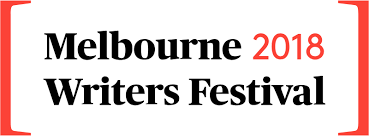 I talked a little about my vacation to Tasmania but I want to take some time to talk about Melbourne. After spending two wonderful weeks exploring what Tasmania had to offer, we finished off with a weekend in Melbourne to attend the Melbourne Writers Festival. There has been sparks of negativity going around about the festival, often directed at the new artistic director, Marieke Hardy. Most of the complaints were directed towards how different the program was this year. The festival had adopted a theme of ‘a matter of life and death’. Which was interpreted as a grim topic but in reality there was so much to discuss.
I talked a little about my vacation to Tasmania but I want to take some time to talk about Melbourne. After spending two wonderful weeks exploring what Tasmania had to offer, we finished off with a weekend in Melbourne to attend the Melbourne Writers Festival. There has been sparks of negativity going around about the festival, often directed at the new artistic director, Marieke Hardy. Most of the complaints were directed towards how different the program was this year. The festival had adopted a theme of ‘a matter of life and death’. Which was interpreted as a grim topic but in reality there was so much to discuss.
I know we struggled to pick what events we wanted to attend and had to make some heavy sacrifices in order to accommodate everything. The biggest sacrifice was missing out on seeing J.M. Coetzee. However the events we did attend were all amazing and well worth our time. Starting with Written on the Body, a conversation with essayist Ashleigh Young. I wanted to see this event because I want to find new ways to improve my writing and I was looking for inspiration. Ashleigh Young runs a blog called EyelashRoaming and I have to admit that I think this helped me spark my passion. I feel the need to devote more time writing essays rather than reviews, maybe in the style of journalist articles or just creative non-fiction. I need to practise and craft my skills. I probably should write about a topic and see where it takes me. I am obsessed with literature but maybe I need to write about other topics as well. We shall see where this leads me or if I will fall back into old habits.
Next we heard Masha Gessen talk about her new book The Future is History: How Totalitarianism Reclaimed Russia in her talk The Fifth Estate. I admit I have not read anything from Gessen but I am interested in learning about Russian history. Again this was an event to understand more about the process involved in non-fiction writing. While this event did not give me any writing sparks, it was worth hearing Masha Gessen speak. How do you get to a point where you can be considered an authority of a topic? I will pick up some Gessen books in the future, I think there is so much to learn and she just seems like a writer I should be following.
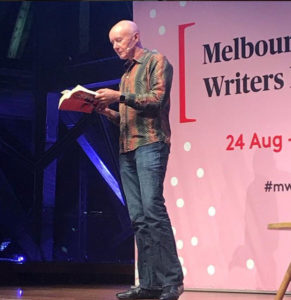
Irvine Welsh was next, with his event Redemption. I have read Welsh before and while I have not read Trainspotting I thought it would be good to see him talk about his new book Dead Men’s Trousers. Besides, he was being interviewed by the amazing Omar Musa, and this was my chance to see him speak as well. I am completely clueless about drug culture so when Irvine Welsh started talking about Dimethyltryptamine (DMT), I had no idea what he was talking about. I am a fan of transgressive literature, so a chance to see Irvine Welsh was one I had to take, though I can honestly say I may never read his novels in the future. From the outside, I feel like Welsh is a little self-destructive but that is very judgemental, however it feels like it links with his writing style. Although I think maybe Welsh has slowed down in his old age. If I wrote fiction, I have an idea to write about someone who wishes to be a writer and thinks that being self-destructive is the way to approach that dream (sort of an auto-biographical look at my past but taking it much further).
I feel like I was the only male in the next event, which was called Sacred Texts: The Book That Made Me a Feminist. This had writers Neko Case, Maxine Beneba Clarke, Michelle Law, Hollie McNish and Emily Nussbaum all in conversation with Zoya Patel about literature, television, music and movies. I love an event that is just a casual conversation about books, it is what I look for when picking an event, as well as picking a podcast. I was pleased to discover Emily Nussbaum who gave plenty of great TV show recommendations. We actually watched Claws on her recommendation. This is the type of event that made me excited to talk about literature and disappointed not many men showed up. The first book that made me a feminist was probably Frankenstein.
Leigh Sales was hosting an event called A Toast: Leigh Sales’s Dream Dinner Party. Being a fan of her podcast Chat 10 Looks 3, we made sure we had tickets. This event had Leigh talking to Lachy Hulme (Romper Stomper), Tony Martin (Martin Molloy), Jan Sardi (Shine) and Samantha Winston (Wentworth) about movies. While I would have preferred to have a talk about literature, like I said before, I like the casual conversation approach. The final event was a conversation about the SBS mini-series Homecoming Queens. Yumi Stynes talks with show creators Corrie Chen and Michelle Law as well as Yassmin Abdel-Magied. This was an amazing event, it was just nice to see four women talking about representation and their own thoughts on the state of the media and pop-culture. If you have never seen Homecoming Queens, I highly recommend you checking it out. I believe it is still on SBS On Demand. We may not have met the amazing Michelle Law but we did meet her mother. Before the event we were casually talking about Michelle and Benjamin Law, when we discovered their mother was standing in front of us.
The Melbourne Writers Festival, to me seems to be doing something far more interesting than the standard writer’s festival. The themed events offered a continuity between the events but still leaving it up to interpretation. I was pleased to see a lot of diversity in the events and speakers. I hope Marieke Hardy continues on as the artistic director, I expect a lot of great events in the future. I just hope I get a chance to see some of them.

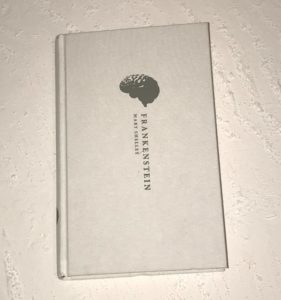 Two hundred years ago, a book was published that literally changed my life. It is very rare to say that a book could have such a life changing effect on someone but in my case it is actually true. It happened about nine years, without going into too many details, I was not happy with myself. I was directionless and went through a self-destructive phase. While it was not just literature that saved me, I do have to give credit to my wife as well. Books ignited the spark in me that made everything else click into place. I am a very different person to who I was back then, I suddenly turned into a passionate and voracious reader thanks to Mary Shelley’s
Two hundred years ago, a book was published that literally changed my life. It is very rare to say that a book could have such a life changing effect on someone but in my case it is actually true. It happened about nine years, without going into too many details, I was not happy with myself. I was directionless and went through a self-destructive phase. While it was not just literature that saved me, I do have to give credit to my wife as well. Books ignited the spark in me that made everything else click into place. I am a very different person to who I was back then, I suddenly turned into a passionate and voracious reader thanks to Mary Shelley’s 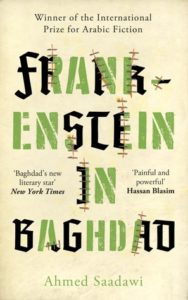 Title: Frankenstein in Baghdad (
Title: Frankenstein in Baghdad (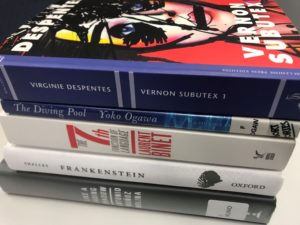 Earlier in the month my wife was suffering from a major headache, so lying in the dark I decided to pick up my kindle to avoid disturbing her. I had
Earlier in the month my wife was suffering from a major headache, so lying in the dark I decided to pick up my kindle to avoid disturbing her. I had 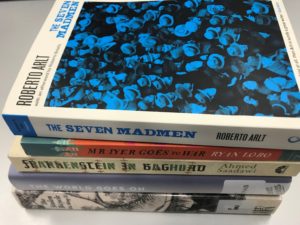 I live in a city that often does not get much rain. So when we get two weeks of constant rain it is a rare treat. There is nothing better than curling up in bed with a cup of tea and a good book, while thunder and lightning is raging outside. I was able to spend those two glorious weeks reading Frankenstein in Baghdad. Most people know about my obsession with Frankenstein, the book that literally changed my life. Normally I am apprehensive about any take on this classic novel but Ahmed Saadawi was able to deliver something sensational. His take on the classic was able to compare the tale with post-invasion Iraq in a unique way. Since it has been two hundred years since Mary Shelley’s novel, I cannot help but think about revisiting the book once again. Oxford World Classics did send me a beautiful hardback edition, so a reread is in my very near future.
I live in a city that often does not get much rain. So when we get two weeks of constant rain it is a rare treat. There is nothing better than curling up in bed with a cup of tea and a good book, while thunder and lightning is raging outside. I was able to spend those two glorious weeks reading Frankenstein in Baghdad. Most people know about my obsession with Frankenstein, the book that literally changed my life. Normally I am apprehensive about any take on this classic novel but Ahmed Saadawi was able to deliver something sensational. His take on the classic was able to compare the tale with post-invasion Iraq in a unique way. Since it has been two hundred years since Mary Shelley’s novel, I cannot help but think about revisiting the book once again. Oxford World Classics did send me a beautiful hardback edition, so a reread is in my very near future. Title: Howards End is on the Landing: A Year of Reading from Home (
Title: Howards End is on the Landing: A Year of Reading from Home (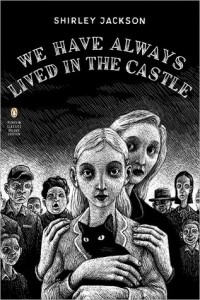 Title: We Have Always Lived in the Castle (
Title: We Have Always Lived in the Castle ( Title: The Year of Reading Dangerously (
Title: The Year of Reading Dangerously ( Title: Literary Theory: A Very Short Introduction (
Title: Literary Theory: A Very Short Introduction ( Title: Young Romantics (
Title: Young Romantics (